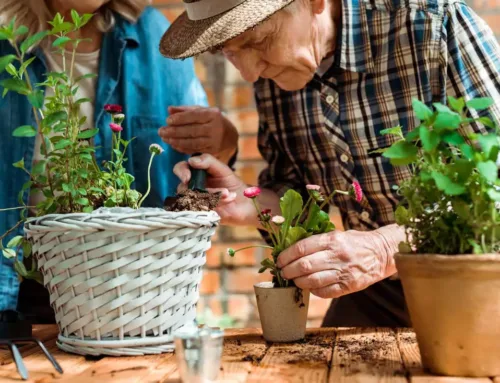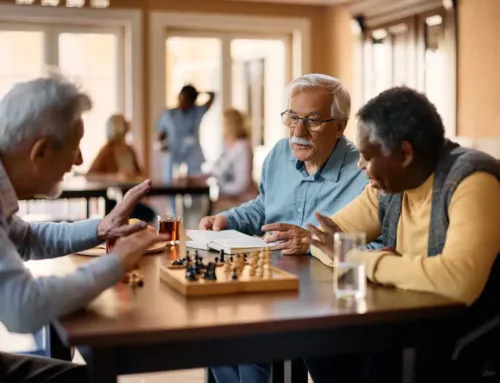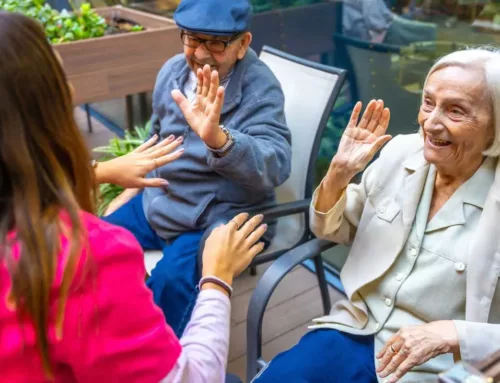
Pause and take a moment to envision what the ideal holiday celebration will look like as you grow older. What do you see?
Consider opening gifts with a flock of excitable grandchildren or reminiscing about precious memories alongside your spouse, adult children, or closest friends.
The holiday season can be an extraordinary time brimming with love, pride, and positive reflection for seniors, but it can also present some challenges.
Thankfully, many of these challenges can be quickly addressed and mitigated, allowing seniors to enjoy the meaningful, family-filled festivities they deserve.
Why Might the Holidays be Difficult for Seniors?
Barriers faced by seniors during the holidays may be physical, practical, or emotional. Physically, new or worsening chronic health conditions like arthritis or diabetes might be challenging to navigate at this time of year.
For example, conditions affecting mobility may make it more difficult for seniors to leave their homes to visit relatives without support. If they have a health problem that requires a lot of management, it might also be challenging to remember all their medications when removed from their routine.
Emotionally, some seniors may find that feelings like loneliness and grief are amplified during the typically joyful and highly social holiday period; it can serve as a painful reminder of isolation or beloved family and friends they have lost. Other seniors may struggle to cope with being unable to fulfil their usual role in the celebrations due to physical, mental, or cognitive health problems.
Additional Challenges for Seniors With Dementia
The holidays can present some additional obstacles for seniors who have a neurocognitive condition like Alzheimer’s or another form of dementia. Those who have developed problems with communication and language or who experience anxiety and irritability because of their condition may find the prospect of socializing at family gatherings overwhelming. Those with memory loss might worry about remembering the names and faces of distant relatives, and those with symptoms surrounding visual perception might have concerns about falling or having an accident during the holidays.
3 Practical Tips to Support a Senior Relative During the Holidays
1.Get into the spirit in a way that suits them.
Don’t be afraid to adjust holiday traditions slightly to help your senior loved one enjoy family occasions. For example, if your loved one is struggling with their mobility, they might prefer to host a get-together at their home where they feel most comfortable. Or if they have Alzheimer’s and quickly become overstimulated, it might help to organize a few smaller, quieter, and more low-key family gatherings.
2.Include them in the preparation and planning.
If your parent has always been instrumental in planning and hosting family holiday events, it might be difficult for them to accept they can no longer do everything they once could. Ensure they feel helpful and included in the preparations by asking them to help with smaller tasks they can safely do. This includes assisting with meal preparation, writing greeting cards, or helping you decide where to hang decorations.
3.Allow them to feel and express their emotions.
Whether they’re struggling with grief, loneliness, or feeling as though they’re no longer able to participate in family traditions as quickly, the holidays can be a mentally challenging time for seniors. And feeling the constant need to be energetic and joyful might make those difficult emotions even stronger. If your loved one is struggling, let them know there’s no pressure to be the life of the party.
Allow them to express their feelings openly. Suppose they need help getting into the festivities this year. In that case, it might help to enjoy more minor activities together that reflect holiday values like family, connection, remembrance, and giving without requiring them to act a part. For example, something as simple as sitting down together, looking at old family photo albums, and reminiscing about happy times can be a great holiday activity for seniors.
Assisted Living and Memory Care at Saguaro Ranch
The holidays are a common time for family caregivers to notice that their parent or relative could use extra support. The combination of spare time spent together, and out-of-the-ordinary activities can highlight that a higher level of senior care is required. If you’ve noticed changes to your loved one’s abilities, physical appearance, or emotional well-being, it may be worth exploring new options like assisted living or memory care.
Common Changes to Look for Include:
-
- Poor mobility
- Unexplained cuts and bruises
- Untidy or unclean home
- Unexplained weight loss
- Diminished social life
- Poor personal hygiene
- Loss of interest in hobbies
- Irritability or agitation
Assisted living communities are the perfect senior care solution for aging adults who value their independence but require some level of assistance with activities of daily living (ADLs) like dressing, using the bathroom, moving around, eating, or brushing their teeth.
Situated in Tuscon, Arizona, at the foot of the Tortolita Mountains, Saguaro Ranch’s senior living community is brimming with unique southern charm. Our beautiful ranch house exudes an aura of peace and luxury that every senior deserves in retirement. Saguaro Ranch residents enjoy enriching daily activities, from gardening and animal visits to yoga and live music.
Seniors can also access 24/7 support tailored to their unique needs from compassionate caregivers. Each day, meals are freshly prepared and served to meet every resident’s dietary needs and preferences. Our memory care residents also benefit from additional supervision to support their well-being and safety within an environment that doesn’t feel clinical or hospital-like.
To experience the unique charm of our senior living community in person, give us a call and organize a personalized tour today.




